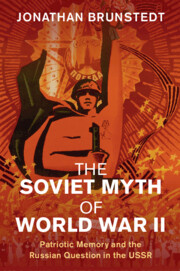Book contents
- The Soviet Myth of World War II
- Studies in the Social and Cultural History of Modern Warfare
- The Soviet Myth of World War II
- Copyright page
- Dedication
- Contents
- Figures
- Acknowledgments
- Abbreviations
- Additional material
- Introduction
- 1 Stalin’s Toast
- 2 Victory Days
- 3 Usable Pasts
- 4 Monumental Memory
- 5 Patriotic Wars
- Conclusion
- Bibliography
- Index
3 - Usable Pasts
The Crisis of Patriotism and the Origins of the War Cult
Published online by Cambridge University Press: 24 June 2021
- The Soviet Myth of World War II
- Studies in the Social and Cultural History of Modern Warfare
- The Soviet Myth of World War II
- Copyright page
- Dedication
- Contents
- Figures
- Acknowledgments
- Abbreviations
- Additional material
- Introduction
- 1 Stalin’s Toast
- 2 Victory Days
- 3 Usable Pasts
- 4 Monumental Memory
- 5 Patriotic Wars
- Conclusion
- Bibliography
- Index
Summary
This chapter focuses on efforts to de-Stalinize the war’s memory and recalibrate Soviet identity in the wake of Khrushchev’s denunciation of Stalin’s personality cult. It shows that the Khrushchev-era program to create a distinctly Soviet historical mythology was contested and had a number of unintended consequences. The project to eradicate Stalin’s cult prompted a critical engagement with the Russian historical motifs that had been a staple of Stalinist patriotic culture. As Khrushchev picked up his assault on the personality cult in 1961, there emerged what this chapter identifies as a “crisis of patriotic identity,” which centered on renewed friction between the pan-Soviet and Russocentric paradigms. The more overt push to instill a pan-Soviet sense of allegiance raised concerns among Russophile intellectuals about the preservation of unique ethnic identities, histories, and hierarchy. Ideologists attempted to forestall this crisis through the “doctrine of the Soviet people,” which elevated the war victory as an exclusively pan-Soviet achievement, while cordoning off Russocentric themes within prerevolutionary and early Soviet narratives.
- Type
- Chapter
- Information
- The Soviet Myth of World War IIPatriotic Memory and the Russian Question in the USSR, pp. 116 - 167Publisher: Cambridge University PressPrint publication year: 2021

